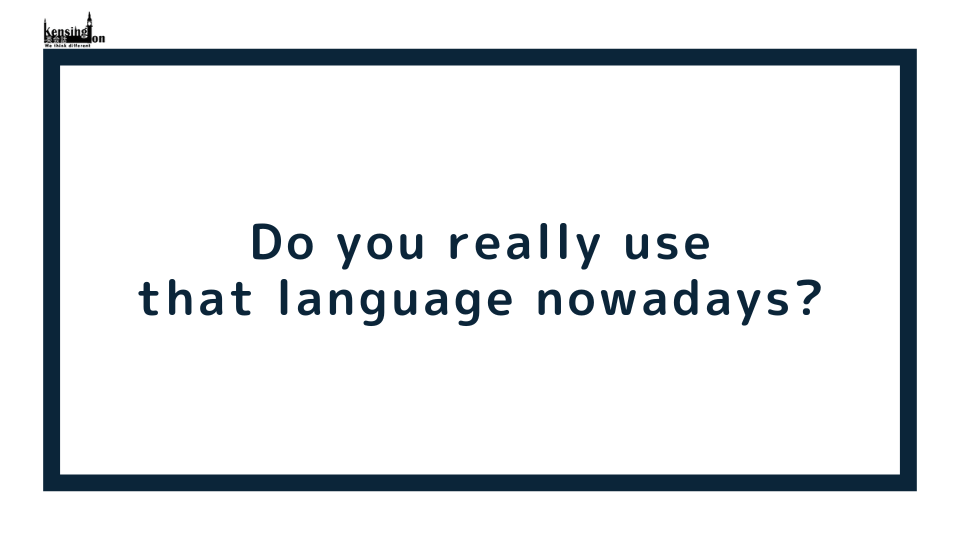【Tamiyo先生】
「Knuckle」は名詞として、指の間接部分、特に指が手と接続する部分をさします。また、動詞として「knuckle」は指の関節を使って何かをこすったり、押したりすることを意味します。
「Knuckle down」という表現は、何かに対して一生懸命に取り組むことを意味します。「Knuckle down」する時は、集中して本腰を入れて作業に取り組むことを表します。
実践的な英語ならケンジントン英会話
ケンジントン英会話では、教科書には載っていない、生きた表現を身に付けることができます。
福岡市内の教室やオンラインで、経験豊富でフレンドリーな講師と一緒に英語を学びませんか?
実践的な英語を学びたい方はケンジントン英会話の公式サイトをチェック!
家庭での使用例
「If we just knuckle down today, we can finish up painting the kitchen.」
(今日本腰を入れて取り組めば、キッチンへのペンキ塗りを終わらせることができるよ。)
「Please knuckle down and finish cleaning up your room so you can play with your friends tomorrow.」
(ちゃんと本腰を入れて部屋の片付けを終わらせなさい。そうしたら明日、友達と遊べるからね。)
「I have to knuckle down and address 100 New Year’s cards tonight so I can mail them in time for them to arrive on new year’s day!」
(今夜中に年賀状100枚を仕上げなければならないんだ。そうすれば元旦に間に合うように郵送できるから!)
友人との使用例
「It’s final exam week so I’ve got to knuckle down and finally start studying.」
(今週は期末試験だから、本気で勉強に取り組まないといけないんだ。)
「Sorry, I can’t talk now. I’ve got to knuckle down and do my homework.」
(ごめん、今は話せないよ。宿題を本腰入れて終わらせないといけないから。)
「I’m going to the library. Every time I try to knuckle down and study one of my flatmates interrupts me.」
(図書館に行ってくるよ。寮のルームメイトたちに邪魔されずに、集中して勉強したいんだ。)
仕事での使用例
「Are you serious about finishing that ABC project by tomorrow? Then you’ll have to knuckle down for the rest of the day!」
(本気で明日までにあのABCプロジェクトを終わらせるつもり?それなら、今日中はずっと本腰を入れて取り組まないとダメだよ!)
「All right, quit joking around. We need to knuckle down and finish this report.」
(よし、ふざけるのはやめよう。本気でこのレポートを終わらせる必要があるんだから。)
ニュースでの使用例
「The Biden administration appears to be playing at war rather than knuckling down and winning it.」 —-Washington Examiner, 11 Jan. 2024
(バイデン政権は戦争に本腰を入れて勝とうとしているのではなく、ただ戦争ごっこをしているように見える。)
「But as the United Nations conference enters its second week and negotiators from 197 countries knuckle down to finalize a new agreement to tackle global warming, attendees were sharply divided over how much progress is being made.」—-New York TImes, 8 Nov. 2021
(国連会議が第2週目に入り、197カ国の交渉者たちが地球温暖化対策の新しい合意をまとめるために本腰を入れて取り組む中、進展の度合いについては参加者の意見が大きく分かれていた。)
まとめ
個人生活でも仕事でも、あるいは学業でも、成功の鍵はやはり決意と努力にあります。だからこそ、集中して取り組み、「Knuckle Down」の心構えを大切にしていきましょう!
実践的な英語ならケンジントン英会話
ケンジントン英会話では、教科書には載っていない、生きた表現を身に付けることができます。
福岡市内の教室やオンラインで、経験豊富でフレンドリーな講師と一緒に英語を学びませんか?
実践的な英語を学びたい方はケンジントン英会話の公式サイトをチェック!
[英語原文]
knuckle (noun) is a part of a finger at a joint where the bone is near the surface, especially where the finger joins the hand.
Knuckle (verb) means to rub or press (something, especially the eyes) with the knuckles.
knuckle down means to begin to work hard at something or apply oneself seriously to a task. When you knuckle down, you really focus and get to work.
at home
“If we just knuckle down today, we can finish up painting the kitchen.”
“ Please knuckle down and finish cleaning up your room so you can play with your friends tomorrow.”
“I have to knuckle down and address 100 New Year’s cards tonight so I can mail them in time for them to arrive on new year’s day!”
with friends
“It’s final exam week so I’ve got to knuckle down and finally start studying.”
“Sorry, I can’t talk now. I’ve got to knuckle down and do my homework.”
“I’m going to the library. Every time I try to knuckle down and study one of my flatmates interrupts me.”
at work
“Are you serious about finishing that ABC project by tomorrow? Then you’ll have to knuckle down for the rest of the day!”
“All right, quit joking around. We need to knuckle down and finish this report.”
on the news
The Biden administration appears to be playing at war rather than knuckling down and winning it. — Washington Examiner, 11 Jan. 2024
But as the United Nations conference enters its second week and negotiators from 197 countries knuckle down to finalize a new agreement to tackle global warming, attendees were sharply divided over how much progress is being made. — New York Times, 8 Nov. 2021
Conclusion: The ‘Knuckle Down’ Mindset
It is clear that determination and commitment are the keys for success whether in personal or professional life, not to mention academically! So let’s stay focus! Let’s embrace the ‘Knuckle Down’ Mindset.
~*~*~*~ \ Follow me / ~*~*~*~
Instagram : @kensington_eikaiwa
Twitter : @Kensington_Eng
Facebook : @kensingtoneikaiwa
YouTube : KENSINGTON英会話
~*~*~*~*~*~*~*~*~*~*~*~*~*
◆お問い合わせはこちら
ケンジントン英会話:お問い合わせフォーム











































































